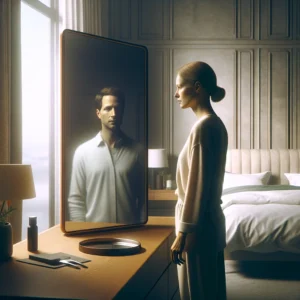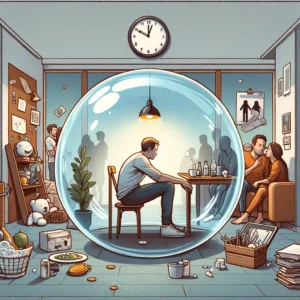You love your partner, but do you love yourself?
Being in a relationship can bring you happiness, but it can also prevent you from reaching your full potential.
Sometimes, we lose ourselves in our relationships and forget our own goals, dreams, and passions.
In this article, you’ll discover how relationships can limit your growth, how to keep growing while in a relationship, and how to find the right balance between love and self-development.
Why Relationships Can Stifle Growth
There are several reasons why the demands of an intimate relationship can impede personal growth:
Loss of Identity

In the first blush of new love, it’s easy to become consumed by the relationship and lose sight of yourself as an individual. Your independent identity begins to fade as you and your partner mesh into a couple. While some loss of independence is natural, losing your sense of self entirely can really stunt your growth.
Decreased Autonomy
Relationships require compromise and accommodation. As you navigate conflicting needs and priorities, you may find your autonomy is diminished as you yield to your partner’s preferences more frequently. This decrease in self-directed choices can limit growth.
Limited Alone Time

Time alone is essential for self-reflection and development. However, between shared activities and responsibilities, it can be difficult to find time for yourself in a relationship. Without adequate alone time, it’s hard to foster internal growth.
Conformity Pressures
Even the most well-intentioned partners may consciously or unconsciously apply pressures to conform in order to maintain harmony in the relationship. Yielding to conformity can mean abandoning growth opportunities that challenge the status quo.
Fixed Roles
Couples often settle into fixed roles dictated largely by habit, convenience, or gender norms. Rigid roles can prevent partners from developing new skills, pursuing new interests, and undergoing personal evolution.
Limited Social Circles
Romantic partners often turn inward, interacting predominantly with each other. A limited social circle cuts you off from fresh ideas and diverse worldviews that stimulate growth. Similarly, time with friends is restricted.
Loss of Drive
The comfort and security of a relationship can reduce the drive for self-improvement. Complacency sets in as partners settle into familiar, mediocre routines. Lacking impetus, personal growth idles.
Maintaining Personal Growth in a Relationship

While relationships can stunt growth in certain respects, partners absolutely can continue nourishing their individuality and nurturing personal evolution while maintaining a happy union. Here are some tips:
Know Yourself First
Strong self-awareness is key for personal growth within a relationship. Understand your core values, interests, goals, and vision for yourself before committing to a partner.
Communicate Your Needs
Openly share your needs for identity, autonomy, and growth with your partner. Negotiate win-win compromises when your needs conflict.
Set Personal Goals
Maintain a sense of direction by setting specific, measurable goals for your personal growth. Strive for progress independently.
Schedule Regular Solo Time
Protect and use alone time purposefully for self-reflection, creative work, skill-building and other growth-oriented activities.
Maintain Outside Interests
Keep cultivating your own interests, hobbies, causes, and friendships outside the relationship. These stimulate new perspectives.
Engage in Self-Work
From journaling to meditation to therapy, choose growth-oriented solo practices aligned with your goals. Commit time for them.
Accept Influence Selectively
While considering your partner’s input, ultimately filter influence through the lens of your values. Don’t automatically conform.
Reassess Routines
Periodically re-examine established roles and routines in case they are limiting your potential. Change what’s stagnant.
Seek Fresh Pursuits Together
Find new experiences, challenges, and skills to tackle jointly. Mutual growth unifies couples.
Allow Space to Evolve
Acknowledge growth means change. Allow yourself and your partner room for gradual evolution without judgment.
Striking a Healthy Balance

When beginning a new relationship, many people struggle to strike the right equilibrium between care for the union and nurturing personal evolution. Here are some guiding principles:
Don’t abandon all independence – While healthy closeness requires interdependence, some autonomy should remain to enable personal growth.
Stand by your core values – Fundamental values anchor identity. Compromising them stunts growth and breeds resentment.
Give each other space to change – Allow your partner space for self-exploration. Change shouldn’t threaten the relationship.
Share growth goals – Mutual understanding of each individual’s objectives creates empathy and encourages progress.
Make time for development – Whether it’s reading, hiking or taking a class, ensure regular time devoted to personal growth.
Release control over each other – Trying to control your partner’s development creates conflict. Give support, not dominance.
Check in on the balance together – Have open discussions about whether you both feel the balance is right. Adjust if needed.
Accept that seasons shift – During major life changes, the balance may tilt more or less toward the individual or relationship temporarily.
Remember your future self – Keep perspective by occasionally envisioning yourself 5 years from now. Will your future self be grateful for the choices you make today?
In Conclusion
Being part of a romantic relationship often requires compromise and accommodation. While this can sometimes limit personal autonomy and identity, partners who are mindful and intentional can absolutely nurture continual growth as individuals. Maintaining open communication, honoring core values, allowing space for evolution, and investing regular time into self-development are key.
By carefully balancing relationship maintenance with individual needs for growth, partners can experience deep intimacy while continuing to progress into their best selves. With understanding and conscious effort, a loving relationship and personal flourishing need not be mutually exclusive, but can beautifully coexist.

